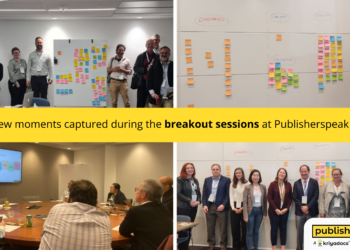 As 2013 draws to a close, it’s time for a quick look at the state of The Scholarly Kitchen. Pardon us this indulgent navel-gazing, it’s in the nature of blogs and social media in general to spend a certain amount of time staring admirably at oneself in the mirror.
As 2013 draws to a close, it’s time for a quick look at the state of The Scholarly Kitchen. Pardon us this indulgent navel-gazing, it’s in the nature of blogs and social media in general to spend a certain amount of time staring admirably at oneself in the mirror.
First, some numbers, for what are we without our metrics, alt or otherwise (all numbers as of 9 AM, December 23, 2013):
- Our traffic continues to climb ever upward, and in 2013 we saw a total of 1,412,924 views of our posts, about 32% more than in 2012. Lifetime since 2008 we’ve seen 3,912,038 views altogether.
- We average just under 4,000 posts viewed per day, though that number goes up to around 5,000 if you eliminate weekends when we’re not actively posting. A typical post is read around 1,000 times on the day it posts, 2 to 3 times that much for a particularly active post.
- Our most read post for the year was Phil Davis’ analysis of PLOS ONE’s Impact Factor, which was viewed nearly 157,000 times since it went live on June 20. The enormous level of interest in the Impact Factor for megajournals is something I wrote about previously and despite the efforts like DORA, continues unabated.
- Beyond that post, our most read stories posted in 2013 were about the legal threats we received from Edwin Mellen Press, Joe Esposito’s post on the new publishing ecosystem, Kent Anderson’s look at the sale of Mendeley to Elsevier, an analysis of the costs of books, and the original piece by Rick Anderson about Edwin Mellen Press that brought about the legal threats mentioned above. What we can perhaps learn from this is that despite our frequent emphasis on journal publishing, the world of scholarly books remains a strong draw, and that suing someone to silence them only results in bringing more attention to what’s being said (the “Streisand Effect” is indeed real).
- We’ve seen 20,200 comments left over the lifetime of the site and average around 400 comments a month. The post on Science magazine’s “sting” efforts drew the most comments this year (128).
- Search engines remain our top source of traffic referrals (nearly all the top 10 search terms that brought readers to our site involved “PLOS ONE” and “Impact Factor”). Twitter was a distant second, and just last week The Scholarly Kitchen Twitter account passed 7,000 followers.
Beyond the quantitative, it’s been a busy year in the Kitchen, with new Chefs Robert Harington, Ken Wissoker and Angela Cochran joining the fold, and Tim Vines departing to pursue his new peer review venture Axios Review. Stewart Wills instigated a semi-weekly podcast that was very well-received and will hopefully resume in the near future. I took the reins as Executive Editor when Kent Anderson took on the Presidency of the Society for Scholarly Publishing, and after a bumpy start figuring out the pacing of a daily blog, things have been relatively smooth. An editor is nothing without his authors, and any positive things that have happened for The Scholarly Kitchen can be directly credited to the consistently insightful group that writes for us, and to them I offer my personal thanks.
I’ve tried to add more diversity to The Scholarly Kitchen this year, more voices and viewpoints, and we’ve increased the number of interview posts to help achieve this. We’re working with some guest posters for the near future and as always continue to recruit new bloggers.
I think the strength of The Scholarly Kitchen remains a fact-based focus on the pragmatic, rather than ideology and emotional arguments about morality. Our authors remain willing to stick their necks out and offer informed critical analysis of the issues of the day. This has become increasingly important as we’re seeing ideological movements like Open Access evolve into practical implementation in the publishing landscape. The argument is no longer about who’s evil and is now about how to get things done.
And that means relying on experience and expertise as we negotiate complex changes to a complex system. Scholarly publishing remains a remarkable industry in the amount of information and support that competitors are willing to share with one another. I’ve also been really happy to see less vitriol in our comments section and more constructive dialogue. I’ve learned something new from a commenter in nearly every post I’ve written this year.
There’s still much to learn though, many new experiments to come. My hope for 2014 is that these lines of communication remain open and we can continue to keep the focus on getting things done rather than getting lost in arguing for the sake of argument.
We may have a few sporadic posts over the holidays, but until we resume our full schedule in January, thanks to all for reading and keep the comments coming. See you in 2014.
Discussion
2 Thoughts on "Taking Stock In the Kitchen: A Look Back at 2013"
For whatever it may be worth, I’ve found the Scholarly Kitchen much better in recent months than previously. It seems more possible to have an actual conversation here.
Just one quibble with what you wrote above: “I think the strength of The Scholarly Kitchen remains a fact-based focus on the pragmatic, rather than ideology and emotional arguments about morality”. I would say the exact opposite. The Kitchen’s implicit stance that morality doesn’t matter or perhaps even exist is its greatest weakness.



